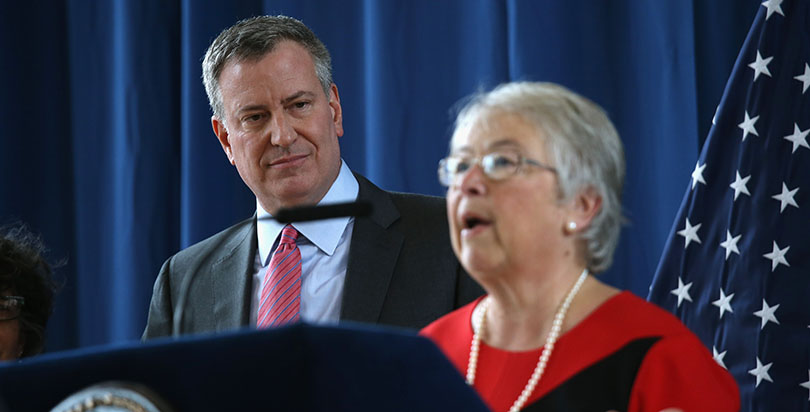Campbell Brown: Will Farina’s Failures Cost De Blasio Control of NYC’s Schools?

This essay previously appeared at the New York Post
Who will control New York City public schools on July 1?
The question has become a referendum on Mayor de Blasio’s leadership. De Blasio requested permanent mayoral control of the schools last year. In June, an unimpressed state Legislature renewed it for a single year.
De Blasio was essentially on probation.
At an Albany budget hearing last week, de Blasio floated a seven-year extension — ensuring his control through a second term — when this year’s renewal runs out. A still-skeptical Senate Majority Leader John Flanagan responded that he “supports mayoral control . . . but not at any price.”
Flanagan and his Republican colleagues are put off by de Blasio’s antagonism toward charter schools. They’ve also called for more scrutiny of the city’s education spending.
De Blasio, then, hasn’t earned a longer leash. Why not?
A primary reason is his handpicked schools chancellor, Carmen Farina.
Farina is a celebrated educator, but good educators are not necessarily good leaders. She may be comfortable in a classroom, but she’s clearly in over her head when it comes to running a system with a million students. Here are her main weaknesses:
Vision: Her piloting of the system is opaque and sloppy. Her central idea is a “capacity framework” that “fundamentally changes” schools through values such as “honor[ing] the fact that students are more than just a test score” and “bring[ing] together the strengths of schools and their communities.”
She’s got progressive jargon, not a strategy.
Competence: Her oversight of low-performing Renewal schools has been ruinous. Her team wasn’t even able to release the Renewal plan until two months after the program was scheduled to start.
Nor did she publish academic targets for the schools until more than a year into the program, and only after Chalkbeat reported that she had refused to release them. And it soon became clear why.
Goals touted as “rigorous” turned out to be absurdly easy to meet — for example, giving schools three years to meet targets designed for one year. Farina validated low expectations and failure for disadvantaged students while making it more likely that the initiative — and administration — will appear successful when goals are met.
A year and a half in, the only achievement that Farina has been willing to cite is a decline in chronic absenteeism.
Rigor: Meanwhile, Farina re-instituted the centralized command-and-control structure of the past — shifting authority away from principals and back to superintendents who report to her — ending a decade of gains in school autonomy and accountability.
Farina doesn’t rely on evidence in making these decisions. She requires Renewal schools to use her favored reading program even after a study found poor students performed better using a different program.
She dismissed four-year randomized trials showing that the Bloomberg-era small schools produced large student gains as merely “one view of things.” She suggested that charters push out low-performing students before state tests and then refused to provide evidence or to retract.
Urgency: Nearly 80 percent of city high-school graduates attending community college require remedial coursework. About 10,000 Hispanic and 7,000 black students who should have graduated in 2015 — roughly one-third of each cohort — either dropped out or are still in school with diminishing odds of success.
Farina echoes a time when education was even less organized to serve the interests of children, a feeling driven home by a recent report in the New York Post that at least one old-fashioned “rubber room” — in which teachers accused of misconduct spend their time, on full pay — has resumed operation in Queens under her watch.
Of course, Farina was hired in the first place because she was willing to maintain common cause with the teachers union and lend her credibility to City Hall-driven initiatives like pre-K.
Appointing Farina was a safe political choice for the mayor — at the time. Now he needs to get serious.
Facing an oppositional governor and Republican caucus in Albany, a union president publicly predicting failure and mayoral control ending in six months — not to mention the potential for a humiliating state takeover of city schools under a new receivership law — de Blasio must show results, and fast.
Will he be enough of his own man to bring in a big thinker, someone who knows what citywide improvement looks like and can convince people it’s possible?
With due respect for her service, that person is not Carmen Farina.
Get stories like these delivered straight to your inbox. Sign up for The 74 Newsletter

;)
